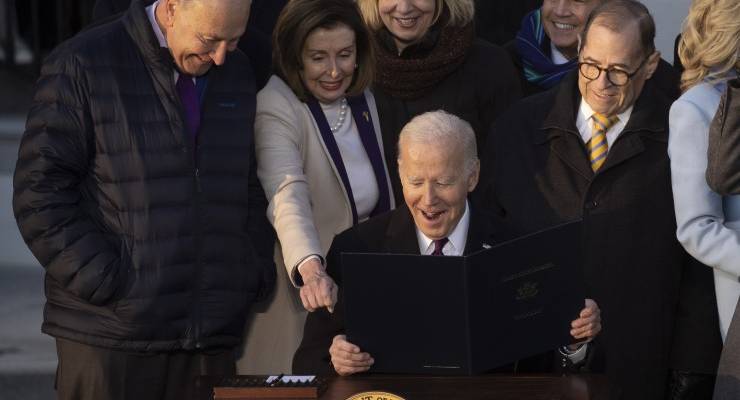
Defenders of US “global leadership” sometimes concede that Washington has overextended itself, pursued foolish policies, failed to achieve its stated foreign policy aims, and violated its avowed political principles. They see such actions as regrettable aberrations, however, and believe the United States will learn from these (rare) mistakes and act more wisely in the future.
Ten years ago, for example, political scientists Stephen Brooks, John Ikenberry and William Wohlforth acknowledged that the Iraq War was a mistake but insisted that their preferred policy of “deep engagement” was still the right option for US grand strategy. In their view, all the US had to do to preserve a benign world order was maintain its existing commitments and not invade Iraq again. As former US president Barack Obama liked to say, we just need to stop doing “stupid shit”.
George Packer’s recent defence of US power in The Atlantic is the latest version of this well-worn line of argument. Packer opens his essay with a revealingly false comparison, claiming that Americans “overdo our foreign crusades, and then we overdo our retrenchments, never pausing in between, where an ordinary country would try to reach a fine balance”.
But a country that still has more than 700 military installations worldwide; carrier battle groups in most of the world’s oceans; formal alliances with dozens of countries; and that is currently waging a proxy war against Russia, an economic war against China, counterterrorism operations in Africa, along with an open-ended effort to weaken and someday topple the governments in Iran, Cuba, North Korea, etc, can hardly be accused of excessive “retrenchment”. Packer’s idea of that “fine balance” — a foreign policy that is not too hot, not too cold, but just right — would still have the US tackling ambitious objectives in nearly every corner of the world.
Unfortunately, Packer and other defenders of US primacy underestimate how hard it is for a powerful liberal country like the US to limit its foreign policy ambitions. I like the US’ liberal values as much as anyone, but the combination of liberal values and vast power makes it nearly inevitable that the US will try to do too much rather than too little.
If Packer favours a fine balance, he needs to worry more about directing the interventionist impulse and less about those who are trying to restrain it.
Why so hard for the US to act with restraint?
The first problem is liberalism itself. Liberalism begins with the claim that all human beings possess certain natural rights (e.g. “life, liberty, and the pursuit of happiness”). For liberals, the core political challenge is to create political institutions strong enough to protect us from each other but not so strong or unchecked as to deprive us of these rights.
However imperfectly, liberal states accomplish this balancing act by dividing political power; holding leaders accountable through elections; enshrining the rule of law; protecting freedom of thought, speech, and association; emphasising norms of tolerance. For true liberals, therefore, the only legitimate governments are those that possess these features and use them to safeguard each citizen’s natural rights.
But take note: because these principles begin with the claim that all human beings possess identical rights, liberalism cannot be confined to a single state or even a subset of humanity and remain consistent with its own premises. No genuine liberal can declare that Americans, Danes, Australians, Spaniards or South Koreans are entitled to these rights but people who happen to live in Belarus, Russia, Iran, China, Saudi Arabia, the West Bank and any number of other places are not.
For this reason, liberal states are strongly inclined to what John Mearsheimer terms the “crusader impulse” — the desire to spread liberal principles as far as their power permits. The same problem bedevils other universalist ideologies, by the way, whether in the form of Marxism-Leninism or the various religious movements that believe it is their duty to bring all humans under the sway of a particular faith.
When a country and its leaders genuinely believe that their ideals offer the only proper formula for organising and governing society, they will try to convince or compel others to embrace them. At a minimum, doing so will guarantee friction with those who have a different view.
Second, the US finds it hard to act with restraint because it possesses a remarkable amount of power. As former US senator Richard B Russell, chairman of the Senate Armed Services Committee and no dove, put it back in the 1960s: “[I]f it is easy for us to go anywhere and do anything, we will always be going somewhere and doing something.”
When a problem arises nearly anywhere in the world, there is always something the US could try to do about it; weaker states do not have the same latitude and thus do not face the same temptations. New Zealand is a healthy liberal democracy with many admirable qualities, but nobody expects the Kiwis to take the lead in dealing with Russia’s invasion of Ukraine, Iran’s nuclear program, or Chinese incursions in the South China Sea.
By contrast, whoever sits in the Oval Office commands a bevy of options whenever trouble arises or an opportunity beckons. A president can impose sanctions, order a blockade, threaten the use of force (or use it directly), and any number of other actions, and almost always without placing the US at serious risk (at least in the short term).
Under these circumstances, resisting the temptation to act will be extremely difficult, especially when a chorus of critics stands ready to denounce any act of restraint as a failure of will, an act of appeasement, or a fatal blow to US credibility.
Should the US just mind its own business? Let us know by writing to letters@crikey.com.au. Please include your full name to be considered for publication. We reserve the right to edit for length and clarity.









An interesting article. I was under the impression that most foreign ‘interventions’ (read invasions, assassinations, subversions and sabotage) were carried out and supported not by liberals in America, but by conservative hawks. Or is Fox really a moderate, left-leaning network badly misunderstood by the overseas public?
ditto – the liberals are either manipulated into supporting or wedged for not supporting, conservative hawks aggressive foreign policy actions in countries which, strangely, often contain valuable resources
….and strategic importance to maintain hegemony.
Come off it; the liberals are only slightly less in thrall to the military-industrial complex than the conservatives.
Thanks Mr D. I’m pretty sure that neither Allen Dulles – originator of the overthrows of Indonesia’s Sukarno and Iran’s Mossadeq – would describe himself as any more liberal than Reagan apparatchiks Oliver North and Donald Rumsfeld, or more liberal than Paul Wolfowitz, Dick Cheney and Donald Rumsfeld (again!) who devised George W Bush’s “first we take Baghdad, then we take Tehran” program.
PS they got bogged down in Baghdad, never made it to Tehran.
America is led by arrogant narcissistic Politicians and others that truly believe that, firstly, they are the Best Country in the World, and secondly, that all other Countries should endeavor to be like them. And if they don’t will bash them into that belief.
The history of humans is one of societies, families, clans, tribes, states, nationalities, kingdoms, and what have you, trying to impose their will/power on others for reasons of economy, faith, hubris (leader or more general). The US is just one of the current iterations, with a global reach rather than just the mob across the river. It’s Missionary Syndrome.
Individual Americans also find it insulting when it is pointed out that American actions frequently yield results which are far from what USA desires.
One particular case in point is the destruction of the Persia/Iran democracy in the 1950s which led to the excesses of the Shah and finally a totalitarian theocracy. Vietnam and Iraq are two.
Americans in general refuse to believe that their way of life is not perfect , when all the evidence appears to show it lags behind most other first world nations.
And, given perinatal & maternal mortality rates, general literacy, social division and euqity, quite a few developing ones.
Reminds me of the time of the Iraq war; when the question was put as to “why did America invade Iraq”, the answer was “Because they could”.
Meanwhile, the majority of US citizens become poorer every day, propping up a bloated military complex.
https://www.worldatlas.com/articles/are-the-poor-getting-poorer-in-the-united-states.html
The rich get richer
The poor get the picture
The bombs never hit you when you’re down so low
Eisenhower warned of the military/industrial complex back in the 1950s
And Smedley Butler warned of it in 1935. War is a Racket was published two years after he blew the whistle on the Business Plot, a fascist plan for a military coup in the US.
Anyone with an eye on history has to regard the average punter as hopelessly optimistic about the powerful… Most people are hanging onto their ankles, just begging to have history repeated up in their date.
Interesting
The first problem is liberalism itself. Liberalism begins with the claim that all human beings possess certain natural rights (e.g. “life, liberty, and the pursuit of happiness”). For liberals, the core political challenge is to create political institutions strong enough to protect us from each other but not so strong or unchecked as to deprive us of these rights.
Surprisingly when working I visited the USA, China etc. regularly. I was challenged once that if I had to choose which country I would rather live in USA or China. I said China because I felt safer, and happier because I was never under threat from drug buyers or sellers etc. Yes I did travel in the industrial suburbs to factories etc.
Both Americans and Chinese are pleasant happy people on a personal basis but the poverty and crime in the US is abhorrent. – and they carry guns.
As someone who lived in China for six years, I felt happier, safer, and more fulfilled there than I have been feeling in Oz the last seven years.
Sure, until you say or do the wrong thing, then you’re in a world of hurt.
Unlike…where else?
That’s a bit disingenuous, isn’t it? We don’t have social credit score here.
Admittedly we have Murdoch’s army of flying monkeys, but that’s hardly in the same category as a government panopticon.
That’s a bit disingenuous, isn’t it? We don’t have social credit score here.
Admittedly we have a certain scumbag’s army of flying monkeys, but that’s hardly in the same category as a government panopticon.
Ask Assange, Snowden, Boyle, Collaery, McBride, or any other whistle-blower, the climate activists etc being jailed in the West now. It’s not just China.
Me too but I never lost sight of the fact that my expat life was a privileged life, and I could leave if things went pear shaped.